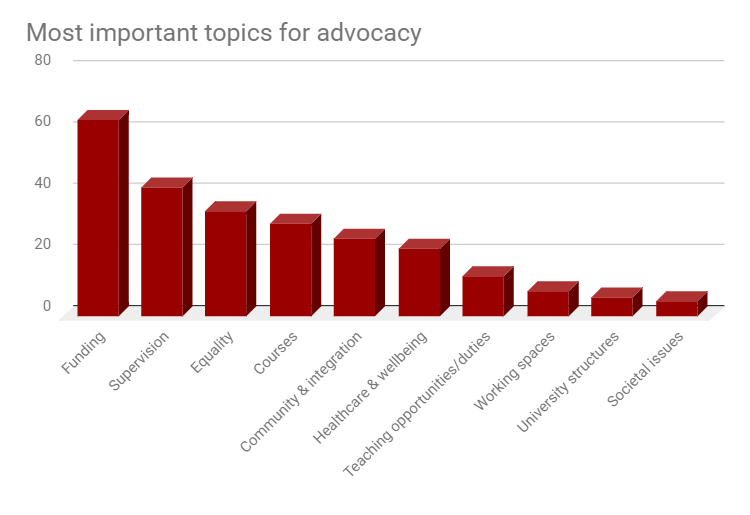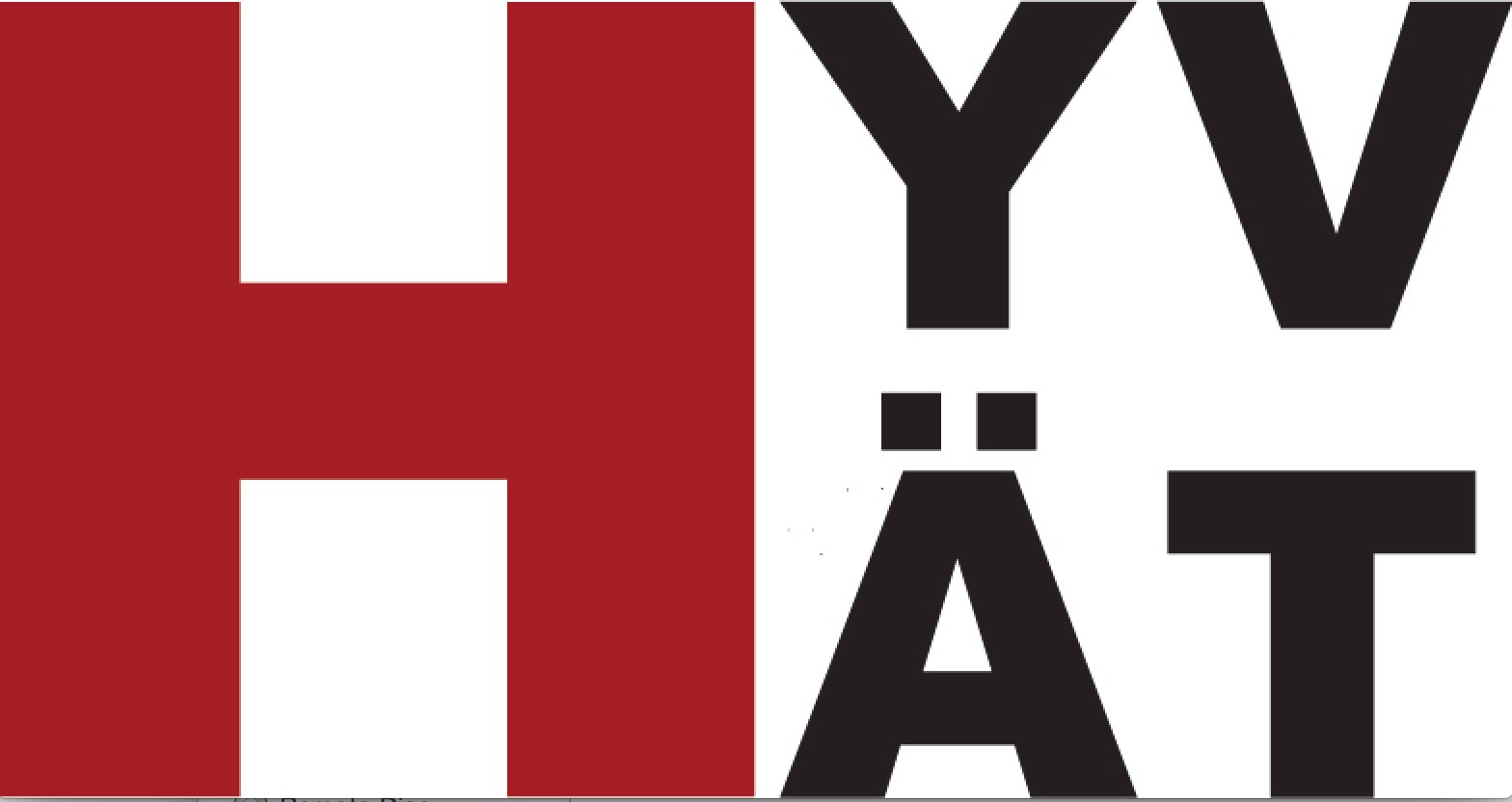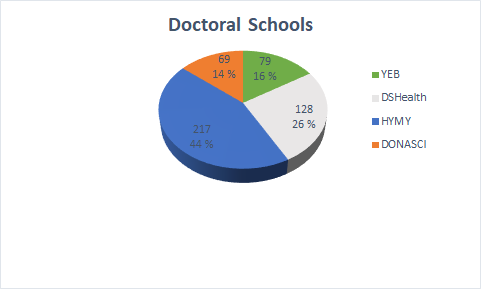In February-March 2018. HYVÄT carried out a survey for all the doctoral students at the University of Helsinki. The purpose of the survey was to find out the current situation, challenges and most appreciated aspects of the doctoral education at the university.
The summarised results of the survey can be found below. A more detailed report is linked in the results section. We wish to hear your comments and views on the results and how they should be interpreted, so feel free to take part in the discussion, share this post or contact HYVÄT board for more information: phd-board@helsinki.fi
The survey received answers from 508 PhD students on the 41 questions of the form. This is around 12 % of all the potential respondents. Because no questions were mandatory to answer, the actual answer counts for each were a bit smaller.
Results
You can find the key results here below, or in the attached presentation:
Survey results presentation (PDF)
More detailed results, analysis and conclusions can be found in the report:
HYVÄT survey report (PDF)
Key findings
When we asked what the most important matters in advocacy are now, the respondents mentioned funding, supervision, and equality between doctoral students. The answers to the other questions in the survey reflect the same three matters.
 Another alarming finding was that 47 % of the respondents did not feel that they were integrated in the research community, as the chart shows. This did not vary much between doctoral schools, but it was extremely connected to having an office at the university.
Another alarming finding was that 47 % of the respondents did not feel that they were integrated in the research community, as the chart shows. This did not vary much between doctoral schools, but it was extremely connected to having an office at the university.
Funding is probably the largest reason for inequality between the PhD students. In the graph for the source of funding for each Doctoral School, we can see that there is quite a lot of variation between the schools. Most alarming are the portions of respondents who use their own savings or unemployment benefits to finance their living. In HYMY this was 25 % of the respondents.
Supervision got an overall good score in the survey, but even in cases when the respondents reported that supervision is fairly good, they often said that there were problems too. About one out of six gave a negative opinion about their supervision. What makes the situation even more complicated for those who have problems, is that the university as whole does not provide any assistance or systematic way of solving the problems. This is something that the university clearly needs to pay attention to, and provide some practical solutions for. Electronic follow-up with for example Thessa is one improvement but it is not enough. Also practical ways to intervene in problematic supervision relationships are needed.
Working for the equality between doctoral students was one of the most frequently mentioned issues on the question of most important topics for HYVÄT’s advocacy. The respondents reported that the inequality between doctoral students with different sources of funding creates three classes of doctoral students that have very different opportunities to do their research. The inequality shows in many practical ways in the everyday work-life of doctoral students. Depending on their source of funding, some doctoral students have access to office spaces, healthcare, and courses, while others do not. These are all things that affect how well people are integrated into the research community.
HYVÄT’s theme in spring 2018 is mental wellbeing. Although the theme was selected before even launching the survey, the survey confirmed it to be a very important topic. Almost 10 % of the respondents brought up this matter in the free answers for the topics of advocacy. Many of them specifically mentioned mental health problems as a core issue. Around 2/3 have access to occupational health care by the university or some other job. Even though the rest are entitled to the communal health care, there were some people who did not know how to access it.
We also asked the respondents for comments to the PhD student representatives. The main issue that came up were a clear need to improve the communication between the representatives and those they represent. In addition, the respondents had specific suggestions on what issues the representatives could bring up in the steering groups. Many also generally thanked the representatives for their good work.
Lastly, we asked the respondents for comments to the university. At this point, the answers showed widespread disappointment and frustration with the university administration and management. Many felt exhausted by the constant changes and the lack of updated information.
Conclusions & actions
The survey did not reveal too many surprises. On the contrary, it is interesting to see how similar the results are to those from the associations 2015 survey, although the questions were slightly different.
One clear conclusion is that there are as many issues as there are doctoral students. While funding, supervision, equality and integration are the top issues in all the doctoral schools, there is a lot of variation within schools and programmes. In addition, there are differences in how the actual research work is conducted. For this reason, pursuing university-wide changes or regulations is challenging. In some cases, it might even be harmful for those who are already doing well on a particular topic. Nevertheless, the university should be able to ensure that all PhD students, regardless of their source of funding and doctoral school or programme, have the same chances and the same support for doing their doctoral studies and research, and graduating on time.
Development of courses, integration into the research community, and improved wellbeing at work are all matters that the university should be able attend to, given that there is a will to do so. Chances to discuss with the department/doctoral programme/schools what sort of courses are needed could be one solution. Integration into the research community is crucial both for completing the studies on time and for building necessary networks for the future. Possible solutions include for example more working spaces, common spaces, and community-building activities like events, seminars, common lunches, peer mentoring, etc. PhD students need chances to meet both their fellow students and more experienced colleagues. Furthermore, improved integration into the community is likely to improve also the wellbeing at work.
HYVÄT believes that much can be done by improving the communication between doctoral students and their departments, doctoral programmes, and schools. Sharing information is a problem in every organization, large or small, and – perhaps not surprisingly – the university is no exception. A good and fairly efficient way to make the flow of information better is to make sure that new PhD students are properly introduced to their tasks and learn their rights and responsibilities from the beginning of their studies. That way they can focus their energy on doing their studies and research instead of spending time on trying to navigate chaotic university structures.
Immediate actions by HYVÄT
From the survey results, we have concluded that there are some immediate actions that HYVÄT can take to make PhD life better. These include working on:
- Supervision: more specific guidelines for supervision, education for supervisors (already piloted in Viikki), limits of how many supervisees a supervisor may have; assistance with funding applications (need not be only from supervisors).
- PhD student rights: A clear list that shows what all the PhD students are entitled to regardless of their funding. This list should be uniform all across the university. The list could be extended to show what kind of rights each type of funding gives in addition. In the longer run the gap between the funding types needs to be decreased.
- Sharing information about HYVÄT on all campuses: The results show that HYVÄT is still fairly unknown to many of the PhD students and that there is huge variation on how well the association has reached different the campuses. HYVÄT needs to introduce themselves to new students face-to-face, and visit events organised at the campuses. For example, these survey results will be shared as widely as possible.
- More analysis on the survey results: The amount of data collected in the survey is huge and people with different backgrounds want to know different aspects. Analysis will be extended to show more results specific to each campus. HYVÄT is also eager to hear further comments on what else to take into account.
Long term plans
- Equality: Right now, there is a big difference between the working conditions of those who are employed by the university and the rest. This gap needs to be gradually decreased as much as possible even though it would require money and other resources.
- Community: The results show that integration to the community is a huge factor in PhD life and it needs to be taken seriously. Doctoral students belong to different communities: research groups, departments, doctoral programmes, doctoral school, and faculties, and these have different significance in the daily research work. The closest and most important research community is still discipline-based, and integration in this environment is crucial because that is what ties doctoral students to the closest colleagues, supervisors, most relevant information, etc. Integration to the doctoral programme and school can likewise be very important, as these offer larger cross-disciplinary networks, but they cannot replace the immediate research community of the department/research-group.
- Healthcare & wellbeing: Universal healthcare for all PhD students – like YTHS for the undergraduate students – would be a huge nationwide debate and is out of reach of HYVÄT’s resources at least for now. However, smaller improvements can be made within the university. One good example is HYVÄT’s suggestion to extend the study psychologists’ services to all PhD students.



2 Replies to “HYVÄT survey for doctoral candidates: Integration a major issue in PhD life”
Comments are closed.